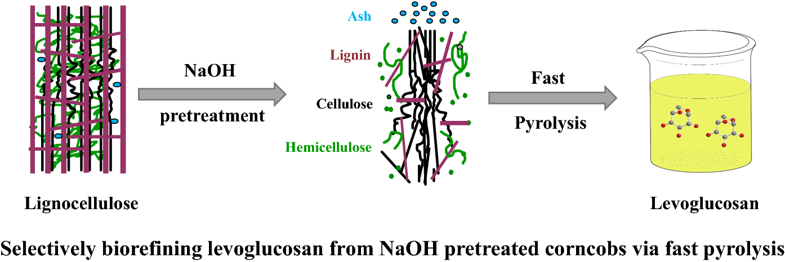Fast pyrolysis is realized as a versatile technology in the conversion of cellulose and is a comparable technology with enzyme or acid hydrolysis for saccharification of biomass. However, the low yield of levoglucosan from lignocellulose and the presence of inhibitors to biocatalysts in the pyrolysate hamper the fermentable utilization of levoglucosan.
Researchers from Xishuangbanna Tropical botanical Garden (XTBG) and Guangzhou Institute of Energy Conversion conducted a study aimed to enhance the production of levoglucosan. They performed dilute alkali pretreatment on lignocellulosic biomass prior to fast pyrolysis of corncobs for a selective conversion.
Higher NaOH concentration (0–3%) and higher temperature (40–80 °C) of pretreatment promoted the removal of AAEMs and lignin. During fast pyrolysis, the yield of levoglucosan (34.8%) from NaOH pretreated sample was 10.6 times higher than that from un-treated corncobs (3.0%).
The improvement could be explained by the removal of alkaline and alkaline earth metals and lignin by pretreatment, which were of benefit to the levoglucosan formation.
In addition, yields of total acids, furans, ketones and phenols (common inhibitors to the biocatalyst) decreased drastically from pretreated corncobs, compared to un-treated corncobs.
Accordingly, NaOH pretreatment which could enhance the production of levoglucosan, and limit the formation of microorganism inhibitors (such as organic acid, furans and phenols) could be considered as a feasible route to improve the fermentability of lignocellulosic pyrolysate.
The study entitled “Selectively biorefining levoglucosan from NaOH pretreated corncobs via fast pyrolysis” has been published online in Cellulose.
Contact
ZHANG Fan Ph.D
Key Laboratory of Tropical Plant Resources and Sustainable Use, Xishuangbanna Tropical Botanical Garden, Chinese Academy of Sciences, Menglun 666303, Yunnan, China
E-mail: Zhangfan226@126.com


